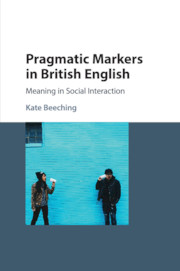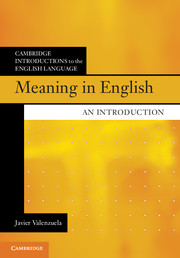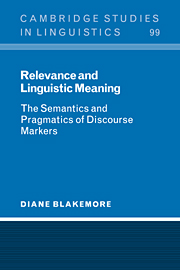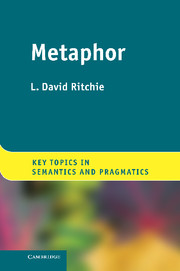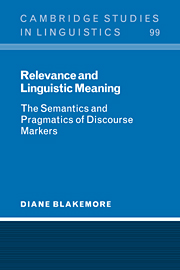Pragmatic Markers in British English
Fundamental to oral fluency, pragmatic markers facilitate the flow of spontaneous, interactional and social conversation. Variously termed 'hedges', 'fumbles' and 'conversational greasers' in earlier academic studies, this book explores the meaning, function and role of 'well', 'I mean', 'just', 'sort of', 'like' and 'you know' in British English. Adopting a sociolinguistic and historical perspective, Beeching investigates how these six commonly occurring pragmatic markers are used and the ways in which their current meanings and functions have evolved. Informed by empirical data from a wide range of contemporary and historical sources, including a small corpus of spoken English collected in 2011–14, the British National Corpus and the Old Bailey Corpus, Pragmatic Markers in British English contributes to debates about language variation and change, incrementation in adolescence and grammaticalisation and pragmaticalisation. It will be fascinating reading for researchers and students in linguistics and English, as well as non-specialists intrigued by this speech phenomenon.
- Combines sociolinguistic and historical approaches to provide a deeper understanding of the polysemy and functions of pragmatic markers
- Each of the six markers is presented and analysed in a similar format, allowing readers to effectively study a single marker in isolation, or look at the different markers comparatively
- Draws together data from a range of sources which allows preliminary conclusions to be made about changes in the way markers are used, and how they are perceived
Reviews & endorsements
'Kate Beeching's important contribution to the study of pragmatic markers in English combines - for the first time - detailed sociolinguistic synchronic analysis with historical corpora studies in an accessible, informative, and readable text.' Laurel Brinton, University of British Columbia
'Kate Beeching's volume will be very helpful to anyone interested in pragmatics and sociolinguistics, as well as to specialists of pragmatic markers … the very clear review of the literature, the definite conclusions that can nonetheless be drawn from the data, and the parallel and systematic study of six markers in the same variety of English, make the volume a most important contribution to the field.' Laure Gardelle, Cercles
'The book not only provides a comprehensive discussion of these markers but, more importantly, offers an analytic framework that future investigation into pragmatic markers can use, thereby contributing to pragmatic marker studies in particular. Furthermore, the book also demonstrates the usefulness of corpus investigation techniques in exploring pragmatic phenomena, thereby contributing to the field of corpus pragmatics in general … we value the book highly and as such we would recommend it to all those who are interested in (corpus) pragmatics.' Yuxin Li and Hang Su, Journal of Pragmatics
Product details
No date availablePaperback
9781108708005
273 pages
230 × 152 × 14 mm
0.4kg
6 b/w illus. 84 tables
Table of Contents
- 1. 'Well I mean I just sort of like you know…'
- 2. Corpus approaches, choice of markers and methodology
- 3. Well
- 4. Just
- 5. You know
- 6. Like
- 7. Sort of
- 8. I mean
- 9. Conclusion.

